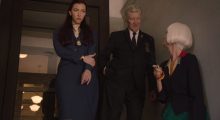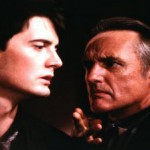Dennis Lim
-
Twin Peaks: A Language More Powerful Than Words

Of all the remarkable aspects of Twin Peaks: The Return, perhaps the strangest is not something that is present, but something that’s absent: the utter lack of any recognizable psychology. Characters simply aren’t motivated by the familiar psychological archetypes and cliches that underpin almost all narrative entertainment, especially series-based television. It’s not so much that the plot is inscrutable or resistant to interpretation, but that characters react to what’s happening around them in ways that look and feel familiar, but which betray little if anything of what’s going on in their heads. As opposed to shows like House of Cards […]
by Nicholas Rombes on Jul 10, 2017 -
Watch: What is “Lynchian”?

What defines the unmistakeable cinema of David Lynch? This recent video essay explores this question, using text from David Lynch: The Man from Another Place, the new book by Dennis Lim. “The paradox of the Lynchian sensibility is that it is at once easy to recognize and hard to define,” intones Kevin B. Lee in What is “Lynchian”? over at Fandor Keyframe. From the quaint small towns of Twin Peaks and Blue Velvet where darkness lurks beneath the surface to the haunted Los Angeles nightscapes of Lost Highway and Mulholland Drive, Lynch’s films find skewed perspectives on familiar settings. Returning to certain indelible images, Lynch has mined the same themes […]
by Paula Bernstein on Dec 16, 2015 -
Lost in a Dream

“I don’t think humans communicate well.” —Lisandro Alonso I agree with the Argentine director. In our present age — when everyone has to be “connected” all the time, doing more than one thing — the chatter, the noise, can be maddening. Encountering the work of Lisandro Alonso makes me recall the feeling of lying on the floor and listening to a record as a teenager: not texting or talking or answering emails, simply listening. Alonso’s films let the viewer pay attention and dream simultaneously. Spare in dialogue, attentive to landscapes, meditative in pacing, they allow one to get lost in […]
by Alix Lambert on Jan 21, 2015 -
WHAT’S IN MY INSTAPAPER: SUNDAY MORNING LINKS, 1/16/11
A quick, commentary-lite version… Joseph Conrad wrote a science-fiction novel. “Young and Restless Never Gets Old” — Dennis Lim in the Times on Gregg Araki. Big tech news this week: Google announces that it won’t support the H.264 codec and the HTML5 video tag in its Chrome browser in favor of its own WebM codec. It’s all very complicated and tech-y, but Google’s argument is that they’re supporting “open standards” by backing a codec without royalty issues. Problem is, Apple’s Safari and Microsoft’s IE both use the H.264 format and the short-term victor is likely to be Adobe, whose Flash […]
by Scott Macaulay on Jan 16, 2011



